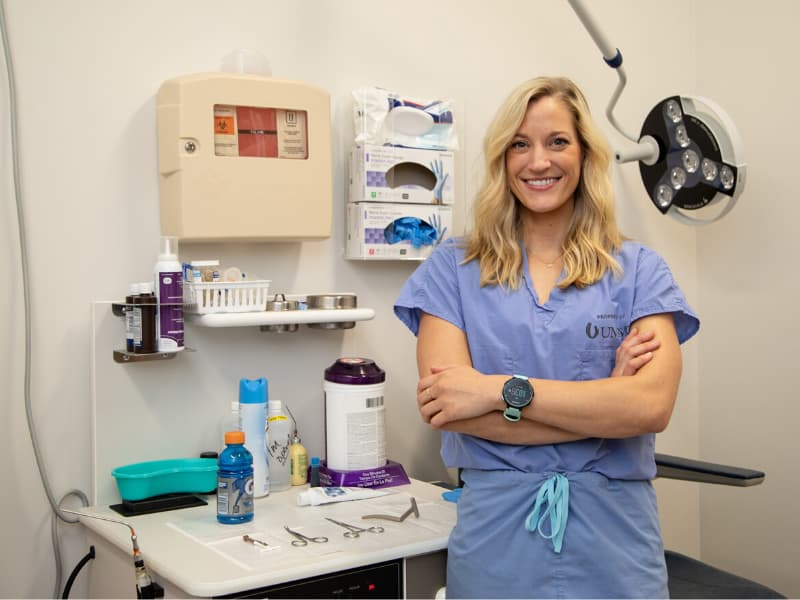People of the U: Caroline Murray

Caroline Murray’s interest in speech pathology started early and simmered until she was older.
“My little brother was a late talker,” she said. As an almost 6-year-old sister, she tagged along for his speech pathology visits and learned a bit of sign language.
She remembered that experience as she considered a career, shadowed a speech pathologist and entered school to work with children.
“Then I fell in love with the medical side of it,” she said.
At the University of Mississippi Medical Center, she works mostly with patients who have speech, voice and swallowing problems, including many with cancer, stroke or brain injuries.
Her work involves far more than helping people speak. Since the mouth, tongue, throat are central to breathing, swallowing and speech, the therapy covers all three.
From the Cancer Center and Research Institute clinics at Jackson Medical Mall, she said, “The majority of the patients I see have laryngectomies, and many have tongue cancers too.”
Much of her work is with patients from the CCRI Interdisciplinary Head and Neck Oncology Program, centered in the Department of Otolaryngology clinic at JMM.
“I see some chemo patients,” she said “A lot of times those patients will have dysphagia or difficulty swallowing during or after their treatment. The majority of patients I see have had some type of surgical resection to their mouth or throat.”
She also sees radiation therapy patients who may have swallowing difficulties.
When people have trouble swallowing, they may stop trying, leading to muscle atrophy and a bigger impediment to regain an action most people take without thought.
Murray works with the knowledge that helping restore speech and swallowing helps restore quality of life and can make social experiences less intimidating for patients.
“Eating is a very social thing. We meet friends, family for drinks, for dinner. A lot of patients want to shy away from those experiences and that can make people more likely to be depressed and isolated,” she said.
Dr. Gina Jefferson, a surgeon who heads the Head and Neck Oncology Program, said Murray works to educate and provide therapy so patients get the most from their treatment. “She understands the direct quality of life implications that dysphagia and dysarthria pose,” Jefferson said.
Josephine Alston, chief of the Division of Speech Language Pathologists and clinical director of the UMMC Voice and Swallowing Center, called Murray an outstanding speech language pathologist.
“She is a most knowledgeable expert when it comes to cancer-related swallowing and voice concerns,” Alston said.
“Most people don’t realize the impact of being able to give someone the ability to voice, communicate or to eat again after surgery,” Alston said. “This therapy she provides is vital in their rehabilitation and allows them continued enjoyment in life and emotional well-being as they navigate through the healing process in their cancer journey. Caroline is a champion for these patients to regain these skills to make them feel whole again, and they all sing her praises.”
Just as Murray’s family accompanied her brother to sessions, she welcomes family who come with her patients.
“When patients know their families are on board and can understand what’s going on it helps so much at home with prescribed exercises and what the patient needs,” she said. Despite visitor restrictions during the coronavirus pandemic, she has worked to keep those channels open.
Part of her work includes working with patients whose larynx, or voice box, has been removed, usually as a result of cancer.
Surgeons may implant a device to enable speech for those who no longer have a speech box. It’s her job to help the patient learn to use it.
“Usually for two to three weeks they can’t talk,” she said. When she meets with them to introduce the mechanism, she instructs them to finally say what they want to their family.
“They almost always say, ‘I love you,’ and it’s such a heartwarming moment,” she said.
Losing such essential functions is isolating and even scarier when a cancer diagnosis is involved, she said.
“That’s what I love about working with this population.Educating and sharing our knowledge is so helpful.”
Outside work, the Kansas native said she loves outside activities and misses riding horses, a mainstay of her childhood. When her parents moved to Mississippi, she sought an externship at UMMC and stayed.
Every institution is rich with personal stories. We want to know ours.
Do you know a student, staff, volunteer or faculty member at the University of Mississippi Medical Center whose story would make an interesting feature or deserves to be recognized?
Know someone who you think more people should know about because of his or her commitment to his or her job and/or the people he or she works with or for? Who has a fascinating hobby? Who participates in a remarkable group? Who has accomplished something amazing?
We want to learn more about each individual who makes up our extraordinary UMMC Family, and we want to share what makes each person unique and special in the Front and Center section of our dynamic new UMMC Intranet.
To nominate someone to be considered for a Front and Center feature, just complete and submit this short form. If that person is picked for a feature, a member of the Communications and Marketing staff will contact him or her to learn more about his or her personal story.
Soon, the rest of the Medical Center will know why your nominee is an outstanding reminder of what makes this place so special – the Front and Center.


